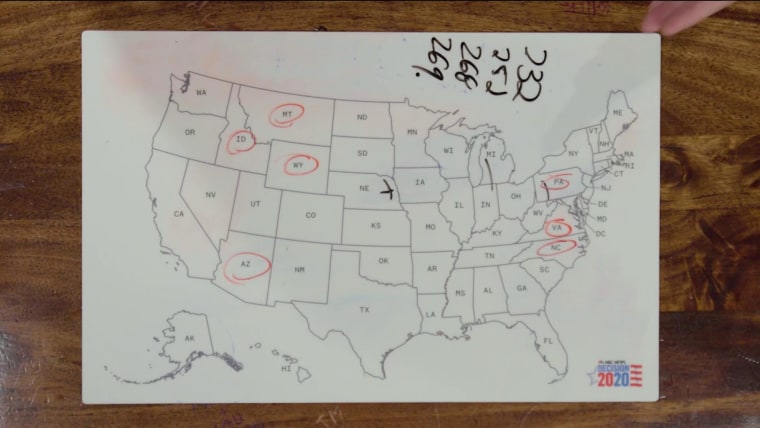As the Democratic contest hurtles toward South Carolina and Super Tuesday, Democrats face a profound choice as to the direction of their party and the personal traits and policy positions of their nominee. In the process, they might also be choosing between very different road maps to beating President Donald Trump in the Electoral College.
To win in November, the Democratic nominee will likely need to hold all 20 states Hillary Clinton carried in 2016, plus flip some combination of the six states Trump carried by less than five points: Arizona; Florida; Michigan; North Carolina; Pennsylvania; and Wisconsin.
The conventional wisdom surrounding frontrunner Bernie Sanders is that his nomination would be the dawn of a new era for Democrats and the culmination of a leftward shift of young voters embodied by Alexandria Ocasio-Cortez. In reality, Sanders' only realistic path to the White House might be to "turn back the clock" by leaning into the same Rust Belt states that abandoned Clinton and embraced Trump's populist, anti-establishment message in 2016: Michigan; Pennsylvania; and Wisconsin.
Let our news meet your inbox. The news and stories that matters, delivered weekday mornings.
Sanders often emphasizes the need for a massive surge of new voters to beat Trump in the fall and pledges he'll expand the electorate left. But there's little evidence he's done that so far in February's contests (never mind the fact he's winning far fewer votes than he did in 2016).
Turnout in Iowa's and Nevada's caucuses — while higher than in 2016 — was lower than in 2008. In New Hampshire's primary, turnout was higher than in 2008 in terms of raw votes cast, but the biggest surges weren't in Sanders' zones, but rather in suburbs where rivals Pete Buttigieg and Amy Klobuchar performed best.
Despite Sanders' status as the oldest candidate in the field, he could prove a terrible fit for retiree-heavy Florida, a quintessential battleground. Sanders's praise for aspects of Cuba's regime, refusal to call Venezuelan President Nicolas Maduro a dictator, and antagonistic relationship with pro-Israel advocacy groups like AIPAC could cause him to underperform to varying degrees with three groups critical to winning the state: Cuban-American; South American; and Jewish voters.
That means Sanders' electability versus Trump likely still depends on his ability to win back disaffected blue-collar whites in the Upper Midwest who used to vote for Democrats but didn't take to Clinton in 2016. And that's not to say there wouldn't be tough obstacles: his pledge to ban hydraulic fracturing, for example, could be a serious liability in natural gas-rich western Pennsylvania, an ancestrally Democratic region.
On the other hand, a Mike Bloomberg nomination might come with a sunnier, more suburban path of least resistance against Trump. His wealth and pro-business orientation could give him a comparative advantage over other Democrats in traditionally free-market Sun Belt states dominated by expensive media markets and large metropolitan areas: Arizona; Florida; and possibly Georgia or Texas.
Texas would be the ultimate "power play" bet for Democrats: Winning Texas alone would give the Democrats the 38 votes they need to flip the Electoral College blue. Trump won it by 807,179 votes in 2016, but base on an analysis of Census turnout estimates, there were roughly 4.3 million eligible non-white Texans who didn't vote that year. Registering, persuading and turning out enough of those non-voters would require a massive investment — one that Bloomberg is easily the best-positioned in the field to make.
However, Bloomberg's status as a billionaire and advocacy for stricter gun control could be serious liabilities in more rural, populist and anti-elite states such as Michigan, Wisconsin and potentially even Minnesota or Maine.
As for Joe Biden, his union alliances, moderate stance on natural gas and deep personal roots likely make him the best-positioned candidate in Democrats' top tier to wrest Pennsylvania's 20 electoral votes back from Trump.
But after the Keystone State, Biden's most promising path to 270 votes is less clear-cut. He and other Democratic pragmatists like Buttigieg or Klobuchar would probably have no choice but to take the fight to Trump in both the "Rust Belt" and "Sun Belt" battlegrounds and see what happens.
The next week won't just determine who's in the best shape to capture the Democratic nomination. It could determine the contours of the nation's political map for years to come.
"easy" - Google News
February 27, 2020 at 04:06AM
https://ift.tt/37YZbyp
Democrats have different routes to win the Electoral College. None are easy. - NBC News
"easy" - Google News
https://ift.tt/38z63U6
Shoes Man Tutorial
Pos News Update
Meme Update
Korean Entertainment News
Japan News Update
Bagikan Berita Ini















0 Response to "Democrats have different routes to win the Electoral College. None are easy. - NBC News"
Post a Comment